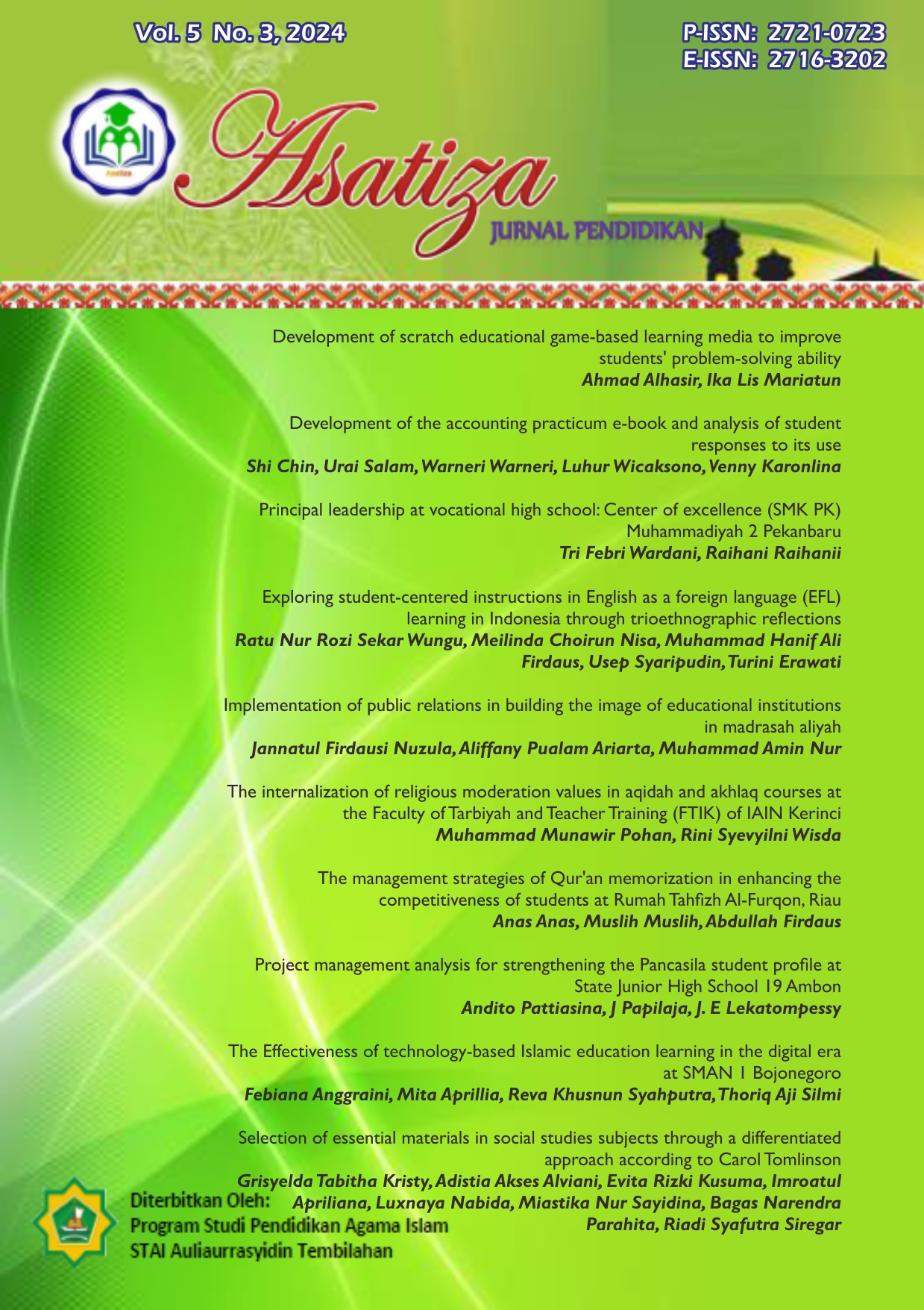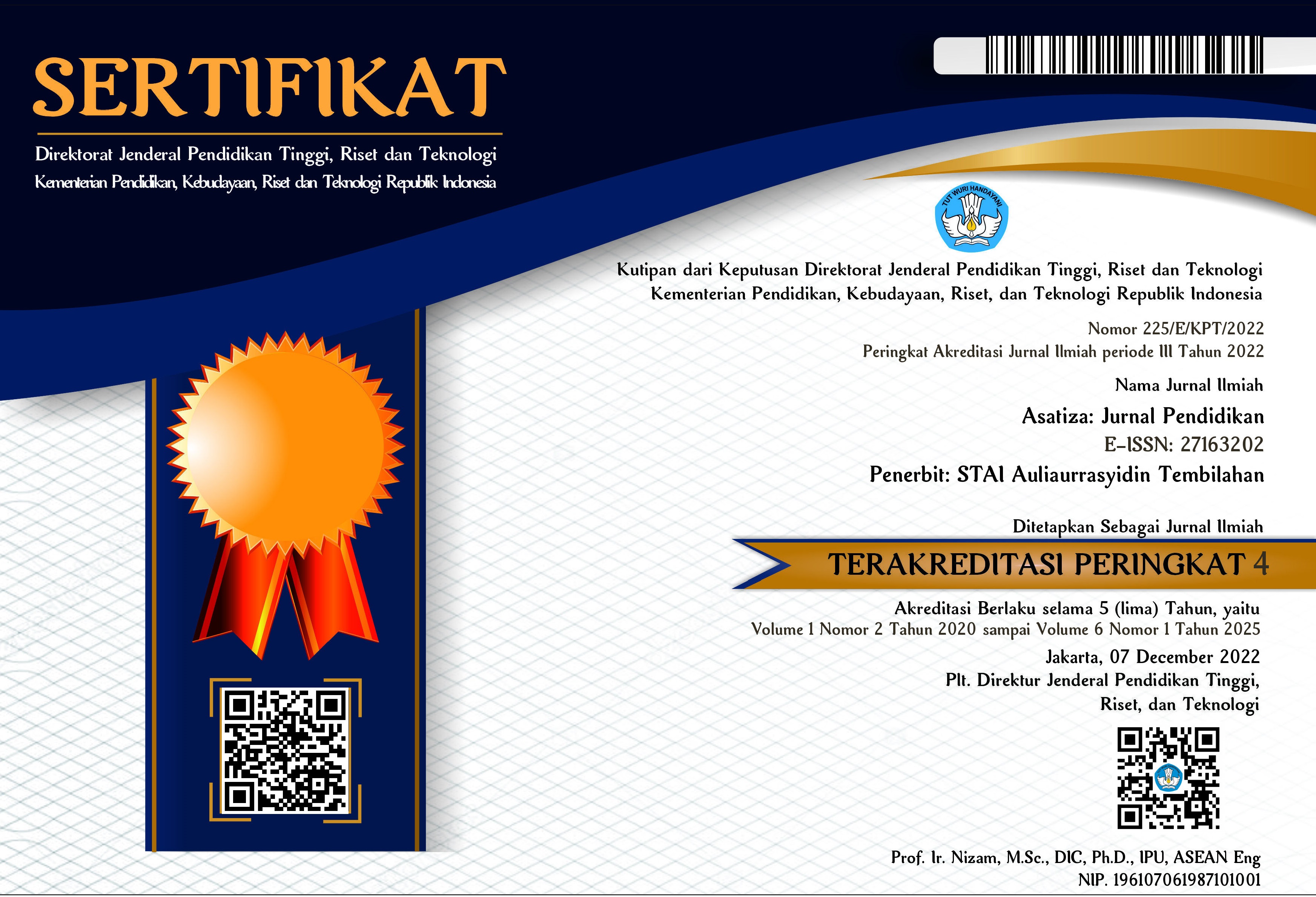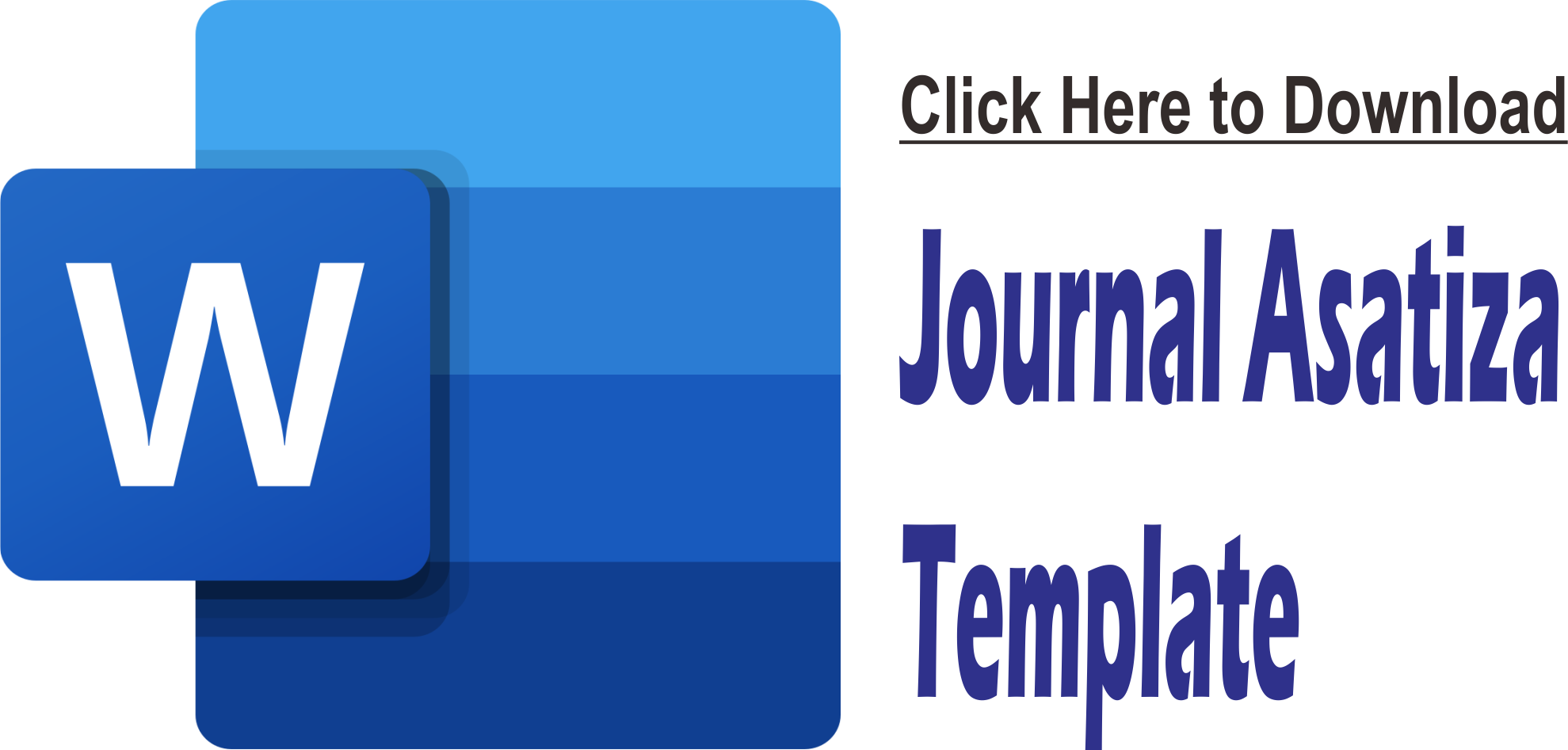Development of the accounting practicum e-book and analysis of student responses to its use
DOI:
https://doi.org/10.46963/asatiza.v5i3.1887Keywords:
Accounting practicum, E-Book, Socio-Economic StatusAbstract
This study aims to develop an E-Book for accounting practicum and evaluate user responses to its implementation. A needs analysis revealed that 48 out of 51 students lacked access to learning resources and required instructional media, correlating with their suboptimal learning outcomes. The research utilizes a Research and Development (R&D) approach, specifically employing the 4D model. The Technology Acceptance Model (TAM) Questionnaire was administered to gauge user feedback. The participants included 51 eleventh-grade students from SMKS Filadelfia Pemangkat. Data analysis involved both qualitative and quantitative descriptive methods to address the research questions regarding the E-Book's design, user feedback, and any significant disparities in responses based on socio-economic status. The E-Book, developed using Canva and edited with Heyzine, comprises 2 chapters, 4 videos, 2 Excel files, and 2 online quizzes. User responses from small and large group trials were overwhelmingly positive, categorized as "Strongly Agree." Further analysis indicated that students from higher socio-economic backgrounds had a higher median score (3.95) compared to those from moderate (3.50) and underprivileged backgrounds (3.00). These findings suggest significant differences in user responses based on socio-economic status.
Downloads
References
Dewi, E. S. (2023). Pengembangan Media Pembelajaran Berbasis Flipbook pada Materi Struktur dan Fungsi Jaringan Tumbuhan di SMA Negeri 1 Kotagajah. IAIN.
Dwi Martha, Z., Pramono Adi, E., & Soepriyanto, Y. (2018). Ebook berbasis mobile learning. JKTP, 1(2), 109–114.
Gonźalez, J. C., Guzḿan, J. L., Dormido, S., & Berenguel, M. (2013). Development of interactive books for control education. IFAC Proceedings Volumes (IFAC-PapersOnline), 10(PART 1), 150–155. https://doi.org/10.3182/20130828-3-UK-2039.00043
Gunawan, & Ritonga, A. A. (2019). Media Pembelajaran Berbasis Industri 4.0. RajaGrafindo Persada.
Hunta, A. andrew, Tinangon, J. J., & Walandouw, S. K. (2021). Evaluasi sistem dan prosedur penerbitan surat pemerintah pencairan dana (sp2d) pada Dinas Koperasi Kota Bitung. Jurnal EMBA, 9(3), 1245–1256. https://doi.org/10.35794/emba.v9i3.35508
Istifarida, B., Santoso, S., & Yusup, Y. (2017). Pengembangan e-book berbasis problem based learning-gis untuk meningkatkan kecakapan berfikir keruangan. Jurnal Penelitian Pendidikan, 20(02), 134–149. http://hdl.handle.net/11617/9155
Kholifah, S. (2017). Pengembangan e-book dengan software flipbookmaker untuk pembelajaran mata kuliah akuntansi keuangan di STEKOM Semarang. Maksimum Media Akuntansi Universitas Muhammadiyah Semarang, 8(1), 2580–9482. http://jurnal.unimus.ac.id
Khomaria, I. N., & Puspasari, D. (2022). Pengembangan e-modul berbasis model learning cycle pada materi media komunikasi humas kelas xi OTKP. Jurnal Pendidikan Dan Konseling, 4(5), 2492–2503. ttps://doi.org/10.31004/jpdk.v4i5.6993
Mawarni, S., & Muhtadi, A. (2017). Pengembangan digital book interaktif mata kuliah pengembangan multimedia pembelajaran interaktif untuk mahasiswa teknologi pendidikan. Jurnal Inovasi Teknologi Pendidikan, 4(1), 84–96. https://doi.org/10.21831/jitp.v4i1.10114
Mukarromah, A., & Andriana, M. (2022). Peranan guru dalam mengembangkan media pembelajaran. JSER Journal of Science and Education Research, 1(1). https://jurnal.insanmulia.or.id/index.php/jser/
Novitasari, D., Ratnawuri, T., & Pritandhari, M. (2019). Pengembangan media pembelajaran elecronic book (e-book) berbasis edmodo kelas x SMK Kartikatama Metro. Jurnal Pendidikan Ekonomi UM Metro, 7(2), 107–115. http://dx.doi.org/10.24127/pro.v7i2.2533
Pratiwi, A. Z., & Rochmawati. (2019). Pengembangan bahan ajar e-book interaktif pendekatan kurikulum 2013 mata pelajaran praktikum akuntansi lembaga/instansi pemerintah kelas xi AKL SMK Negeri 1 Lamongan. Jurnal Pendidikan Akuntansi, 07(02), 145–151.https://garuda.kemdikbud.go.id/documents/detail/2625774
Rahmita Maulida, D., & Susilowibowo, J. (2021). Pengembangan media pembelajaran electronic book (e-book) pada mata pelajaran praktikum akuntansi perusahaan dagang. Jurnal Pendidikan Akuntansi (JPAK), 9(3), 2722–2750. https://doi.org/10.26740/jpak.v9n3.p302-311
Ratna, D. N., Karolina, V., & Tiur Maria, H. S. (2023). Keterkaitan antara status sosial ekonomi dan jenis kelamin dengan kemampuan literasi digital pada siswa SMA Negeri 1 Mandor Kata kunci. Jurnal Ilmiah Ilmu Pendidikan, 6(5), 3333–3338.http://Jiip.stkipyapisdompu.ac.id
Sari, M. N. I. (2021). Pengembangan bahan ajar buku elektronik (E-book) pada mata pelajaran akuntansi dalam materi perusahaan jasa di kelas xi akuntansi SMK PGRI Pekanbaru.
Sundari, Ayuni, D. S., & Prahara, R. S. (2023). Analisis kondisi sosial ekonomi dan tingkat pendidikan masyarakat desa Talok, Kecamatan Dlanggu, Kabupaten Mojokerto. Jurnal Agama, Sosial, Dan Budaya, 6(4), 773–788. https://doi.org/10.31538/almada.v6i4.4478
Talitha, S., Rosdiana, R., & Hilal Mukhtar, R. (2023). Pengembangan bahan ajar digital flipbook dalam meningkatkan kompetensi guru MGMP Bahasa Indonesia SMA Kota Bogor. SWARNA Jurnal Pengabdian Kepada Masyarakat, 2(1), 2963–184.https://doi.org/10.55681/swarna.v2i1.314
Thiagarajan, Sivasailam, & Others. (1974). instructional development for training teachers of exceptional children: A Sourcebook. Indiana Univ., Bloomington. Center for Innovation in Teaching the Handicapped. National Center for Improvement of Educational Systems (DHEW/OE).
Vivi Fitriyani, V. A. (2020). Bahan ajar e-book interaktif mata pelajaran praktikum akuntansi lembaga berbasis kontekstual. Jurnal Penelitian Dan Pengembangan Pendidikan, 4(3), 514–525. https://doi.org/10.23887/jppp.v4i3.29740
Wulandari, M., & Djaja, S. (2014). Analisis kesulitan belajar akuntansi pada materi jurnal penyesuaian (studi kasus pada siswa kelas xi IPS di SMA Negeri 1 Pakusari Tahun Ajaran 2013-2014). Jurnal Edukasi, 23-27. https://garuda.kemdikbud.go.id/documents/detail/297361
Downloads
Published
Issue
Section
License
Copyright (c) 2024 Shi Chin, Urai Salam, Warneri Warneri, Luhur Wicaksono, Venny Karolina

This work is licensed under a Creative Commons Attribution-ShareAlike 4.0 International License.
Authors who publish with this journal agree to the following terms:
1. Copyright on any article is retained by the author(s).
2. The author grants the journal, right of first publication with the work simultaneously licensed under a Creative Commons Attribution shareAlike 4.0 International License that allows others to share the work with an acknowledgment of the work’s authorship and initial publication in this journal.
3. Authors are able to enter into separate, additional contractual arrangements for the non-exclusive distribution of the journal’s published version of the work (e.g., post it to an institutional repository or publish it in a book), with an acknowledgment of its initial publication in this journal.
4. Authors are permitted and encouraged to post their work online (e.g., in institutional repositories or on their website) prior to and during the submission process, as it can lead to productive exchanges, as well as earlier and greater citation of published work.
5. The article and any associated published material is distributed under the Creative Commons Attribution-ShareAlike 4.0 International License











2.png)



